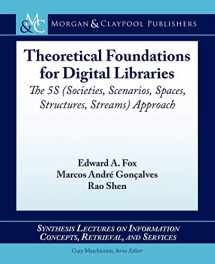
Theoretical Foundations for Digital Libraries: The 5S (Societies, Scenarios, Spaces, Structures, Streams) Approach (Synthesis Lectures on Information ... Concepts, Retrieval, and Services, 22)
Book details
Summary
Description
In 1991, a group of researchers chose the term digital libraries to describe an emerging field of research, development, and practice. Since then, Virginia Tech has had funded research in this area, largely through its Digital Library Research Laboratory. This book is the first in a four book series that reports our key findings and current research investigations. Underlying this book series are six completed dissertations (Gonçalves, Kozievitch, Leidig, Murthy, Shen, Torres), eight dissertations underway, and many masters theses. These reflect our experience with a long string of prototype or production systems developed in the lab, such as CITIDEL, CODER, CTRnet, Ensemble, ETANA, ETD-db, MARIAN, and Open Digital Libraries. There are hundreds of related publications, presentations, tutorials, and reports. We have built upon that work so this book, and the others in the series, will address digital library related needs in many computer science, information science, and library science (e.g., LIS) courses, as well as the requirements of researchers, developers, and practitioners.
Much of the early work in the digital library field struck a balance between addressing real-world needs, integrating methods from related areas, and advancing an ever-expanding research agenda. Our work has fit in with these trends, but simultaneously has been driven by a desire to provide a firm conceptual and formal basis for the field. Our aim has been to move from engineering to science. We claim that our 5S (Societies, Scenarios, Spaces, Structures, Streams) framework, discussed in publications dating back to at least 1998, provides a suitable basis. This book introduces 5S, and the key theoretical and formal aspects of the 5S framework.
While the 5S framework may be used to describe many types of information systems, and is likely to have even broader utility and appeal, we focus here on digital libraries. Our view of digital libraries is broad, so further generalization should be straightforward. We have connected with related fields, including hypertext/hypermedia, information storage and retrieval, knowledge management, machine learning, multimedia, personal information management, and Web 2.0. Applications have included managing not only publications, but also archaeological information, educational resources, fish images, scientific datasets, and scientific experiments/simulations.
Table of Contents: Introduction / Exploration / Mathematical Preliminaries / Minimal Digital Library / Archaeological Digital Libraries / 5S Results: Lemmas, Proofs, and 5SSuite / Glossary / Bibliography / Authors' Biographies / Index


We would LOVE it if you could help us and other readers by reviewing the book
Book review



